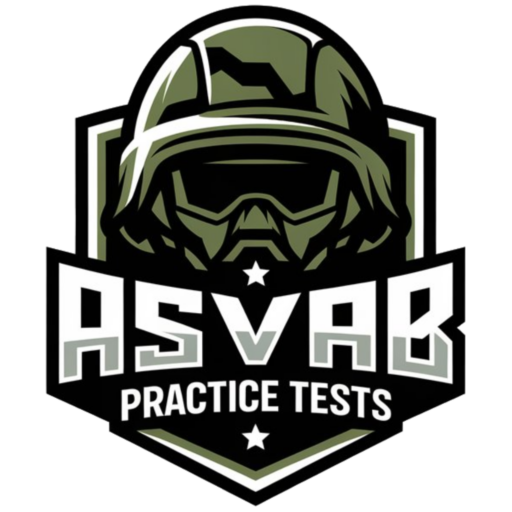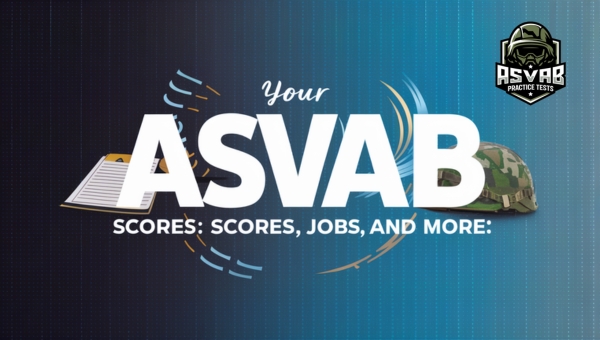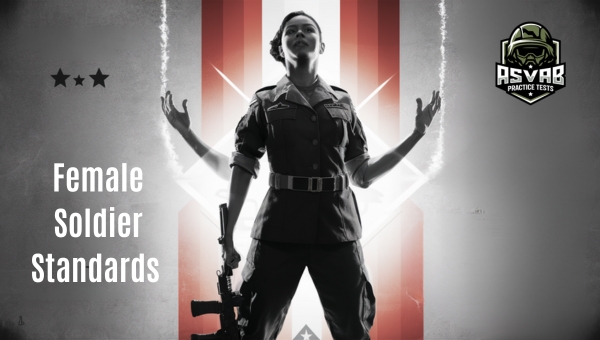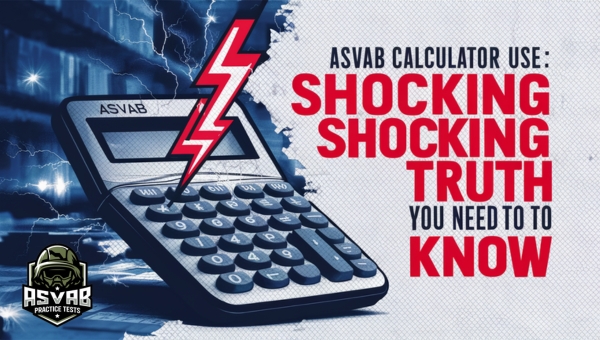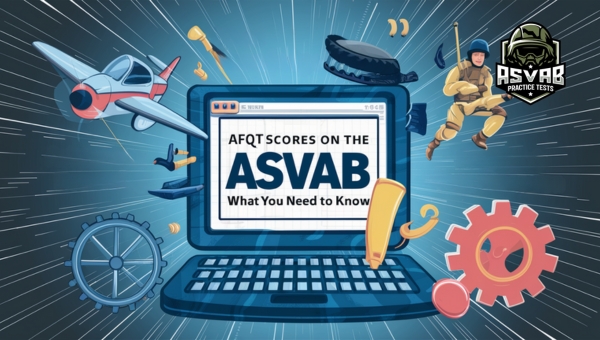ASVAB Test Sections | Master Every Part for Success
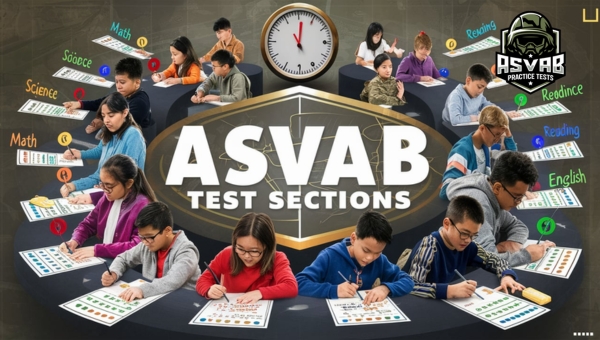
Ready to ace the ASVAB Test and unlock your military career potential? Understanding each section of the ASVAB Test is crucial for effective preparation and can significantly impact your career opportunities within the armed forces.
In this article, we’ll dive into each section, from General Science to Verbal Expression, to ensure you have a comprehensive understanding. We’ll also discuss targeted study strategies to help you prepare effectively. Let’s jump in and master the ASVAB Test together!
Breaking Down The ASVAB Test Sections
The ASVAB Test, or Armed Services Vocational Aptitude Battery, is designed to evaluate the skills and abilities of candidates wishing to join the U.S. military. It consists of several sections, each focusing on different areas of knowledge and aptitude.
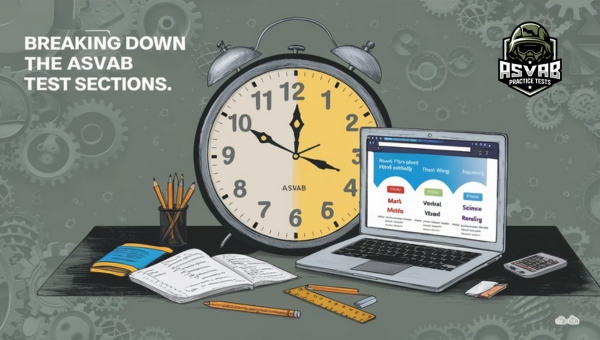
These sections help determine the best fit for various military roles by assessing a candidate’s strengths and weaknesses. Let’s delve into each section to understand their purpose and content.
1. General Science (GS)
The General Science section assesses your knowledge of physical and biological sciences. This section includes questions on biology, chemistry, physics, and earth sciences. For example, you might encounter questions about the human body, chemical reactions, or the laws of motion.
This section is particularly relevant for technical military jobs, where a solid understanding of scientific principles is essential. A good grasp of these topics can significantly impact your ability to perform tasks in fields like medical support, engineering, and other technical roles.
2. Arithmetic Reasoning (AR)
Arithmetic Reasoning focuses on solving mathematical problems using basic arithmetic. This section tests your ability to apply mathematical concepts to real-world scenarios. Questions often involve word problems that require addition, subtraction, multiplication, or division.
For instance, you might be asked to calculate the total cost of items or determine the distance traveled given a certain speed and time. This section is crucial for evaluating your problem-solving skills and your ability to think critically under pressure, which are vital in many military operations.
3. Word Knowledge (WK)
The Word Knowledge section evaluates your vocabulary and ability to understand word meanings in context. You will be tested on your understanding of synonyms and word relationships. For example, you might be asked to choose the word that best matches the meaning of a given word or to select the word that is most opposite in meaning.
Strong performance in this area indicates effective communication skills, which are essential for success in many military roles. Being able to understand and use vocabulary accurately can enhance your ability to follow instructions and communicate clearly.
4. Paragraph Comprehension (PC)
The Paragraph Comprehension section focuses on understanding and interpreting written material. You will read passages and answer questions that assess your comprehension skills. For example, you might need to identify the main idea, determine the meaning of a word based on context, or make inferences from the text.
This section is relevant to numerous military tasks, as many roles require you to follow written instructions or analyze reports. Proficiency in this area can improve your ability to process and understand complex information quickly and accurately.
5. Mathematics Knowledge (MK)
Mathematics Knowledge tests your high school-level math skills, including algebra and geometry. This section measures your understanding of mathematical concepts and your ability to solve problems. Questions might involve solving equations, working with geometric shapes, or applying formulas.
This section is critical for technical roles within the military, as it assesses your logical thinking and problem-solving abilities. A strong score in this area can open doors to advanced technical training and specialized roles.
6. Electronics Information (EI)
The Electronics Information section evaluates your knowledge of electrical systems, circuits, and devices. Questions might cover topics such as electrical currents, circuit components, and electronic terminology. For example, you might be asked to identify the function of a resistor or to explain how a circuit works.
This section is crucial for candidates interested in technical military positions, as it tests your understanding of essential electronic principles. A solid foundation in electronics can be vital for roles involving communication systems, equipment maintenance, and other technical tasks.
6. Auto and Shop Information (AS)
The Auto and Shop Information section covers automotive maintenance and repair, as well as woodworking and metalworking. Questions might include identifying tools, understanding automotive systems, or knowing how to perform basic repairs.
For instance, you might be asked about the function of a carburetor or the best tool for a specific task. This section is important for various support roles within the military that require knowledge of vehicle maintenance and repair, as well as skills in working with different materials.
7. Mechanical Comprehension (MC)
Mechanical Comprehension focuses on the principles of mechanics and physics. This section assesses your understanding of mechanical devices and concepts such as force, friction, and leverage. Questions might involve interpreting diagrams, explaining how machines work, or solving problems related to mechanical systems.
For example, you might need to determine the direction of force in a lever system or explain the function of a pulley. This knowledge is vital for engineering roles and other technical positions in the military that require a deep understanding of mechanical principles.
8. Assembling Objects (AO)
The Assembling Objects section evaluates your spatial abilities by asking you to visualize how objects fit together. Questions might involve identifying how pieces form a complete shape or determining the correct assembly of parts.
For example, you might see a series of disassembled objects and need to choose the correct final arrangement. This section tests your ability to understand relationships among objects, which is important for various technical tasks in military operations. Strong spatial reasoning skills can enhance your ability to work with equipment and understand complex systems.
9. Verbal Expression (VE)
The Verbal Expression score is a composite of your Word Knowledge and Paragraph Comprehension scores. This score reflects your overall communication skills, which are essential for effective interaction in military environments.
Good verbal expression skills can help you convey information clearly, follow instructions accurately, and understand communications from others. This score is an important measure of your ability to perform tasks that require strong language and comprehension skills.
Also Read: Is the ASVAB Hard? Tips & Insights
How to Prepare for ASVAB Test Sections?
Preparing for the ASVAB Test can seem overwhelming, but with the right approach, you can tackle each section effectively.
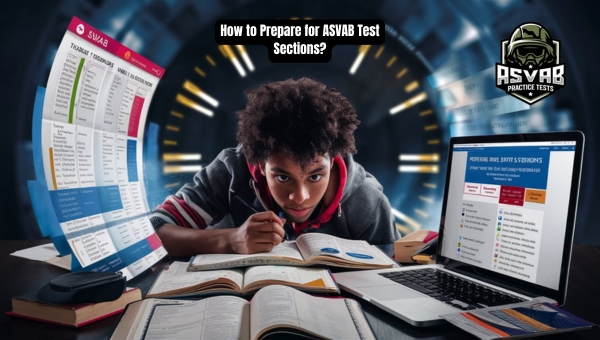
It’s important to use resources that target specific areas of the test, focus on your weaker sections, and balance your study time with practice tests. Let’s explore these strategies in more detail.
a.) Section-Specific Study Guides
Using study guides tailored to each ASVAB section is a highly effective way to prepare. These guides break down the content and format of each section, offering targeted practice questions and explanations.
- Identify Key Areas: Study guides often highlight the most critical topics for each section, helping you focus on what matters most.
- Practice Questions: They provide a variety of practice questions that mimic the actual test, allowing you to get familiar with the types of questions you’ll encounter.
- Detailed Explanations: Good study guides include detailed explanations for each question, helping you understand why certain answers are correct.
- Timed Practice: Many guides offer timed practice sections to help you manage your time effectively during the test.
b.) Focus on Weak Areas
It’s crucial to identify and improve on your weakest sections. This targeted approach ensures that you’re not just studying aimlessly but making significant progress where it’s needed most.
- Self-Assessment: Start by taking a practice test to identify your weak areas.
- Use Online Resources: There are numerous online platforms offering practice questions, video tutorials, and interactive lessons. Websites like Khan Academy and Quizlet can be particularly useful.
- Offline Resources: Don’t overlook the value of traditional study aids like textbooks and workbooks. These can provide a structured approach to learning.
- Regular Review: Make a habit of regularly reviewing your weak areas to ensure continuous improvement.
c.) Balance Study with Practice Tests
While studying the theory is important, it’s equally vital to take practice tests to gauge your understanding and readiness for the actual ASVAB Test.
- Simulate Test Conditions: Take full-length practice tests under timed conditions to get a feel for the test’s pace and pressure.
- Analyze Results: After each practice test, thoroughly review your answers to understand your mistakes and learn from them.
- Mix Study Methods: Alternate between studying theory and taking practice tests to keep your preparation well-rounded and engaging.
- Track Progress: Keep a record of your practice test scores to track your progress over time and adjust your study plan accordingly.
By using section-specific study guides, focusing on weaker areas, and balancing your study time with practice tests, you can prepare effectively for the ASVAB Test. This structured approach will help you build confidence and improve your chances of achieving your desired score.
Conclusion
Understanding the ASVAB Test sections is crucial for anyone looking to join the military. Each section tests different skills, from science to mechanical comprehension, ensuring a well-rounded assessment of a candidate’s abilities. By knowing what each section entails, you can better prepare and improve your chances of achieving a high score.
This, in turn, opens up more career opportunities within the armed forces. Preparation is key, so take the time to study and practice each section thoroughly. If you found this guide helpful, be sure to check out more informative articles on our site to support your journey.
